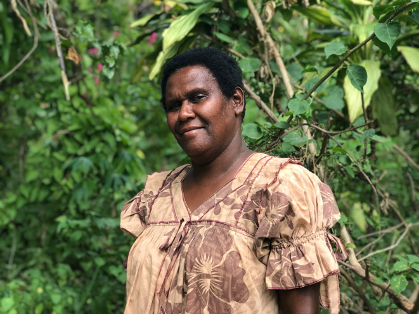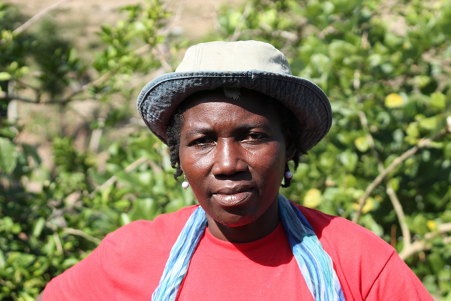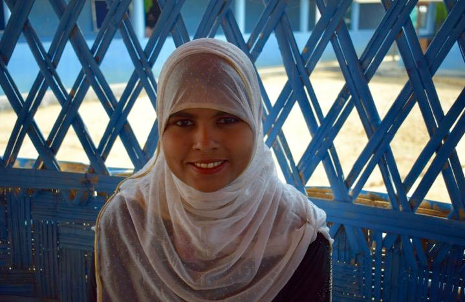During conflict and disasters, women are on the frontlines of humanitarian response caring for their communities – evacuating and caring for children, the injured and elderly, and making sure their families have enough food and water. This burden of unpaid care increases especially when basic services such as hospitals and access to water are inadequate.
Women also play an important role in the recovery process. They have a unique ability to rebuild social networks and revive local economies, and they establish novel ways to protect communities from the worst effects of future disasters.
That’s why ActionAid does things differently. When disaster strikes, we work with local women on the ground to provide support and help save lives. From our experience we know that when women are empowered to lead humanitarian responses their whole community recovers faster.
This has long-term advantages too, lifting women up in to positions of power and influence in their communities and taking huge steps towards gender equality and social justice. In this way, a humanitarian crisis can become a transformative moment for change.
This World Humanitarian Day we’re looking back at some of ActionAid’s work over the last 10 years to support women on the frontlines crises.
Cyclone Pam, Vanuatu, 2015
Leiwia

Vanuatu is one of the most disaster-prone countries in the world and climate change is increasing the frequency and severity of natural disasters in the Pacific region. That’s why after Vanuatu was struck by Cyclone Pam in 2015 – the worst recorded cyclone to ever hit the country – ActionAid set up a women’s forum to lead the humanitarian response. The Women I Tok Tok Tugeta (WITTT) network offers women a space to receive support, have their voices heard and collaborate to ensure future emergency preparation.
Women in the Pacific are often the hardest hit by extreme weather events because their social roles and livelihoods are reliant on natural resources. With rising sea levels, frequent cyclones and longer droughts devastating agriculture in Vanuatu the impact on women is immense. Climate change is a huge concern for Ni-Vanuatu women but they are on the frontlines of response and action!
Leiwia became aware of WITTT as part of ActionAid’s rapid response to Cyclone Pam in Erromango which included founding safe spaces for women to express their concerns and needs. This is significant because it is women who take on the burden of care during a crisis and therefore understand their community’s urgent needs. Since then Leiwia has become a community mobiliser for WITTT and has observed dramatic changes within herself and her community.
In 2019, the women from WITTT, together with ActionAid, launched Women’s Weather Watch which puts information and technology in the hands of women across Vanuatu. Through a system of bulk SMS messaging women leaders are able to share clear early warning messaging to 77,000 women in mere seconds. This innovative and localised effort allows women in remote communities to access and share up-to-date information which can help save lives and livelihoods. In 2020, Women’s Weather Watch was invaluable in alerting thousands to Tropical Cyclone Harold as well as spreading awareness of COVID-19 and health messaging approved by the Vanuatu Ministry of Health. This has led to the women involved now being seen as trusted and respected sources of information within their communities during a crisis.
“In the next few years, WITTT will continue to be strong in Erromango, because the women will come together to voice our concerns. A lot of disasters are coming, and the climate changes. If we come together, mobilise together, talk about those issues… WITTT can help Erromango,” Leiwia said.
Like Leiwia ActionAid believes that WITTT is an avenue for change, empowering local women to lead frontline crisis response and prevention as well as supporting their rights and agency.
Hurricane Matthew, Haiti, 2016
Elsia

When Hurricane Matthew hit Haiti in 2016, Elsia didn’t hesitate to help look after her neighbours and community as well as her five children. “My house was the only one in the region that was still standing so it became a refuge. At least 30 people of every age group were staying there.”
Elsia gave everyone food, water, clothes and made sure they had a safe space to sleep. “It wasn’t just by chance that my house was the only one standing, I felt like it was for a reason,” she said.
ActionAid supported Elsia to become a leader for the Cash for Work scheme which provided 10 days of employment to more than 2,500 community members affected by the hurricane. Half of the participants and most of the project’s leaders were women who worked quickly to ensure economic revival by restoring damaged roads and farmland.
“With solidarity, support, training, awareness and working together we can make a change. Things will get better,” Elsia said.
In total, ActionAid supported more than 58,000 people in the most remote areas of Haiti after Hurricane Matthew. We delivered life-saving food and water supplies, cholera-prevention kits and built long-term resilience through commerce and farming initiatives like Cash for Work. As always ActionAid prioritised women’s rights and protection through safe spaces as well as enterprise and training opportunities for women like Elsia who were on the front lines of humanitarian response.
Rohingya refugee crisis, Bangladesh, 2017
Senoara

ActionAid has been applying its women-led community based approach to support refugees in Cox’s Bazar, Bangladesh to recover from trauma and build new lives since hundreds of thousands of Rohingya people fled persecution in Myanmar in 2017.
ActionAid’s initial response to this humanitarian crisis was to meet emergency needs such as shelter, food and hygiene kits however it has now evolved to focus on the protection and empowerment of Rohingya women.
The Rohingya culture has traditionally curtailed the rights of women by favouring child marriage, forbidding girls from leaving the house once they reach puberty and limiting their access to education. This pre-existing lack of freedom made it almost impossible for women to participate in organising the refugee settlement at Cox’s Bazar as they remained confined to their tents.
Since 2017, ActionAid has set up eight women-friendly spaces offering areas for women’s meetings, training, psychosocial counselling, health checks and a children’s nursery. ActionAid employed female community mobilisers to encourage women to attend these spaces as well as explaining the initiative to male family members.
“When we come here, women not only leave the house, they are learning things, becoming educated, becoming empowered. The discussions here have helped us to realise that we also have opinions. In Myanmar all our choices were imposed by males. But here, I feel that I have a choice, I can go outside, I can make my own decisions. This feels to me like a big empowerment,” Senoara, 18, said.
The women-friendly spaces focus on awareness-raising on issues like gender based violence and child marriage, and give women advice about pregnancy, health, family planning, nutrition and legal support. The women also receive skills training in sewing and growing food to advance their economic independence.
These women-friendly spaces act as a first port of call for women’s needs and issues while also elevating women who attend as trusted sources of information.
Another attendee Somira said, “Whatever I learn in the group, it is my responsibility to discuss with other women in my block (there are about 2,000 houses per block). If another person were to come into the community and tell them what to do, they would not accept it. But they listen to me, because I am one of them – they trust me because I do good for them. This has given me my own, better place within my community.”
By empowering women like Senoara and Somira to lead a localised humanitarian response ActionAid is raising women’s voices and ensuring they can lead their communities to rebuild stronger from crisis, becoming more resilient and transforming women’s social status in the longer term.